14 - A Question of Trust
Tuesday, August 28, 2012
“Would you buy a used car off this man?” It’s the classic question of trust.
So you’ve moved into a strange village, in a foreign country – how do you know who to trust? I was given various bits of advice when I put the word around that I wanted to buy a second-hand car:
1. “Buy one from a Brit who’s selling up and going home”. Really? Is that genuinely your suggestion? Buy a car from someone who a day later is going to be in another country and therefore really doesn’t care if they’ve sold you a pup? I don’t think so.
2. “Buy one from a British-run car dealer on the coast”. Why? They’ve probably bought most of them from Brits moving back to the UK. Anyway, why would there be some unspoken automatic trust for a dealer simply because we speak the same first language?
3. “Whatever you do, don’t buy off a Spaniard – they can’t be trusted.” Yes, sadly I must report that not only was this said to me in all earnestness, it was said by several different people (all British, I hardly need add).
So having listened to these suggestions, I considered an alternative plan. My insurance broker, Antonio, has a friend called Antonio who has a couple of second-hand cars for sale. I agreed to go and test-drive them on Wednesday afternoon. I mentioned this to the ex-pats at the Colmenar Social Club (see blog 11 – Meeting the Brits). Generally speaking, the responses were negative. “It could have been in a bad accident.” “You just don’t know what you’re getting.”
I was almost convinced that perhaps I was taking a risk. So I asked Frank to come along with me to listen to the engine and be my “back-seat expert” (mainly to show that I had someone who knew a bit more about cars).
Frank brought his grand-daughter, aged 3, along. Always a good move! Antonio (the insurance) and his mum played with the little girl while we waited for Antonio (the car) to arrive. A bright red Seat Ibiza pulled up, and Frank, his grand-daughter and I piled in for a test drive. Four bits of information emerged. Firstly, Antonio (the insurance) had already told Antonio (the car) that I had begun to feel I’d set too low a target price and that I wanted air-conditioning. Secondly, Antonio (the car) turned out to be Antonio (the mechanic), who several people had recommended if today’s test-drive hadn’t turned out. Thirdly, Antonio (the mechanic) was going to put in a brand-new battery, replace the gear lever, and put the car through its ITV test (the Spanish equivalent of an MOT) in early September, to have it ready for me on my return. Fourthly, Antonio (the mechanic) is a good friend of Rafael who lives opposite me (and who is a good friend of Antonio from Arco del Sol), and Rafael had already told him that I’m a good neighbour and that he must get me a good reliable car.
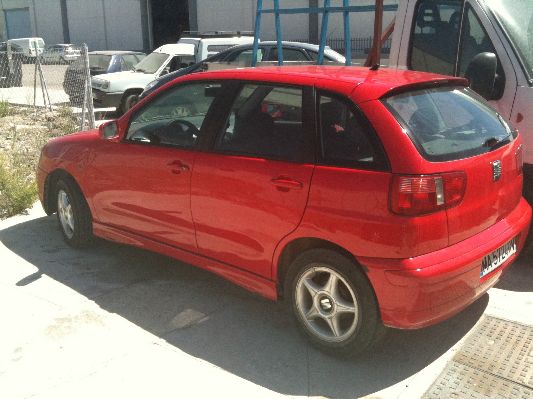 We zoomed off up the highway to test speed, brakes, and engine sound. All seemed fine. We shook on it. I now own a bright red Seat Ibiza. We zoomed off up the highway to test speed, brakes, and engine sound. All seemed fine. We shook on it. I now own a bright red Seat Ibiza.
In the end trust is about two things. I refuse to trust someone JUST because they are British. I refuse to mis-trust someone JUST because they are Spanish. Both those are ridiculous positions to hold. I’d rather use instinct, and watch someone’s eye contact and general demeanour, and get my own feeling about whether he is trustworthy. And secondly I’d rather listen to my Spanish neighbours, who actively want to help me and want me to have a good experience of their village, and who have told me I can trust Antonio the mechanic.
© Tamara Essex 2012
 0
Like
Published at 9:32 PM Comments (13)
0
Like
Published at 9:32 PM Comments (13)
13 - Speaking Subjunctively
Saturday, August 25, 2012
“If I had known, I wouldn’t have come.” My friend Jenny used to teach French, and she says this sentence is a benchmark, an indicator. If you can say it in another language without having to stop and backtrack a couple of times, you can more or less call yourself fluent, or at least competent.
So a few years ago when I was going to Adult Education down in Poole to do GCSE Spanish with my friend Hazel, we used to practice in the car each week, finding different ways of using it. And to the slightly bemused surprise of our Columbian teacher, Carlos, we inserted it into every conversation topic and into every essay. If we had to write about holidays, we would invent a bad experience so we could finish with “If I had known, I wouldn’t have gone.” If we had to talk about food, we’d insert some mythical restaurant meal that made us ill, so we could finish with “If I had known, I wouldn’t have eaten it.” It usually squeezed us an extra mark from Carlos.
Trouble is, it doesn’t impress Spaniards! Unless they themselves are learning a language, or have an unusual interest in grammar, it is hard for them to distinguish between what is actually quite advanced for us learners, yet is perfectly normal usage for them. Frustrating! Still, the main reason for continuing to study the language is not to impress, but to communicate. And it’s up to me to give myself a metaphorical pat on the back when I’ve thrown in a particularly fine grammatical construction, because nobody else will!
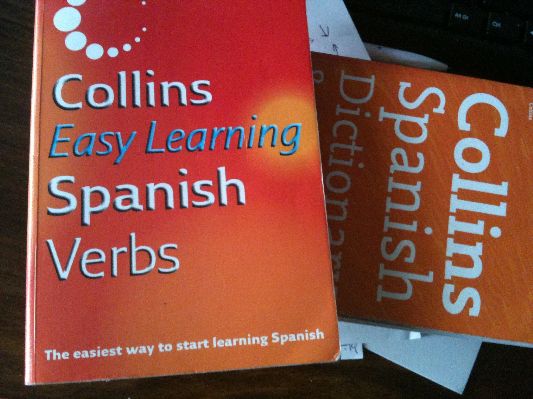 So – back to that sentence. “If I had known, I wouldn’t have come.” “Si hubiera sabido, no habría venido.” Well-constructed as a learning tool – demonstrating the subjunctive and the conditional tenses, and using two separate “rungs” on the haber “ladder” that starts with the nice and easy perfect tense “he comprado, he comido, he vendido” – I have bought, I have eaten, I have sold. So – back to that sentence. “If I had known, I wouldn’t have come.” “Si hubiera sabido, no habría venido.” Well-constructed as a learning tool – demonstrating the subjunctive and the conditional tenses, and using two separate “rungs” on the haber “ladder” that starts with the nice and easy perfect tense “he comprado, he comido, he vendido” – I have bought, I have eaten, I have sold.
“If I had known, I wouldn’t have come.” Once learned, easy to adapt to a wide variety of situations and uses: If I had known, I wouldn’t have eaten it. If I had known, I wouldn’t have bought it. If I had seen it, I wouldn’t have crashed into it. If I had done it, I wouldn’t have told you.
But, while appreciating that original sentence for helping me progress my language skills, I must say it annoys me. It fundamentally oozes negativity. It hints at mistakes made, at wrong choices, at regrets. If I had known, things would have been different. If we hadn’t gone skiing, I wouldn’t have broken my leg. If only I’d known, everything would have been alright. If only I’d had the foresight, I wouldn’t have bought property / shares / a company making cassette players, just before they became worthless. If only we’d known that the pound was going to buy us fewer Euros, we wouldn’t have retired to Spain. If only.
So it’s a sad sentence. But sentences are only collections of building blocks. The words are the constants, their meanings largely fixed, and the great joy of language is choosing which words to use and in what order – the construction of a phrase. This is what gives us the flexibility to use words to express feelings of negativity or positivity. To focus on what went wrong, or on what went right.
Gazing out of my window across higgledy-piggledy roof tiles towards the craggy Axarquía mountains, I look at that sentence one last time. “If I had known, I wouldn’t have come.” I see it now not as one unit, but as separate parts to be deconstructed and rebuilt as I like. I pluck out the negative straight away and metaphorically toss it out of the window.
“Si hubiera sabido, aquí habría venido más temprano.” If I had known, I would have come here sooner.
© Tamara Essex 2012
 0
Like
Published at 6:47 PM Comments (4)
0
Like
Published at 6:47 PM Comments (4)
12 - Poco a Poco
Thursday, August 23, 2012
Poco a poco. Little by little. I learned how to re-light my water-heater. Push knob to summer setting and hold in while pressing the ignition underneath until it lights. Release both knobs slowly. Hot water again – hurrah!
Jose from the local TV shop has been back to put up my aerial, which now serves a dual function. Primarily it provides me with Spanish TV programmes to help improve my language. Additionally it provides me with a tall post on the top terrace, to which could be attached a line and some screening should I find that the single high balcony that could overlook me is occasionally used by its owners. A first evening curled on the sofa watching TV – it’s a big step towards feeling at home.
The other Jose, the carpenter, came to see exactly where I want the bookshelf so he can build it to fit perfectly. He was chuffed to see the rocking chair he’d made, which I had already bought for my bedroom.
Rafael has made the air-conditioning work, by installing the outside part that the previous owner of my house hadn’t got round to. And there’s a little plastic tube running un-noticed back through the wall, down a couple of stairs and outside to remove the water the machine produces. So now I can click on the air-con to cool the room half an hour before bedtime when the nights are muggy. Bliss.
Antonio had arranged for me to test-drive two cars, but I’ve been thinking that it makes sense to spend a little more and get something a bit newer and hopefully more reliable. I think Sebastian at the Peugot garage might be the best contact. No need to rush – better to get it right.
And most surprising of all, Telefonica (now called Movistar but still in a Telefonica van and a Telefonica t-shirt) turned up EXACTLY when they’d said (un milagro - I hope you were sitting down for that bit!) and connected my phone line. My internet company, Europa Network, is now sending me the router I need to rejoin cyber-space and regain the connectivity that feels so necessary these days.
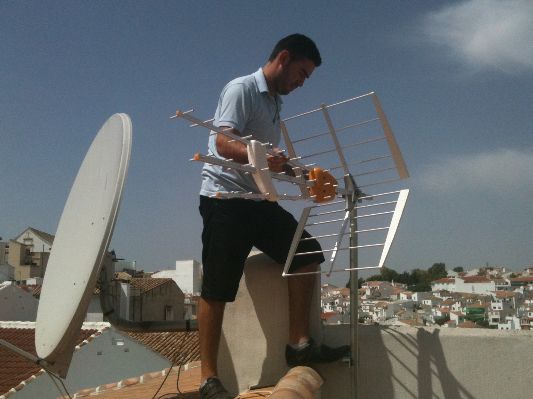 And for light relief in between all this excitement, I’ve been out and about taking photos to illustrate past (and future) installments of this blog. It is my intention that each post should have a photo, even if it’s just a snap of Jose on the roof putting up an aerial. Previous blog posts are now all illustrated – even the one about the bank collapsing! And for light relief in between all this excitement, I’ve been out and about taking photos to illustrate past (and future) installments of this blog. It is my intention that each post should have a photo, even if it’s just a snap of Jose on the roof putting up an aerial. Previous blog posts are now all illustrated – even the one about the bank collapsing!
Poco a poco. Little by little.
© Tamara Essex 2012
 0
Like
Published at 2:22 PM Comments (3)
0
Like
Published at 2:22 PM Comments (3)
11 - Meeting the Brits
Wednesday, August 22, 2012
OK I admit it. I’m judgemental. I try not to be, but I am. And sometimes at British airports in the queues for the Spanish Costas, I judge. There are hen parties / stag parties heading for Benidorm, There are screeching families heading for Torremolinos. There are football fans heading for Barcelona. And there are overly-tanned ex-pats with rather too much bling, loudly and pointedly announcing how they had enjoyed their visit to the UK but were relieved to be getting back to their villa, pool, and Little England community in the sun.
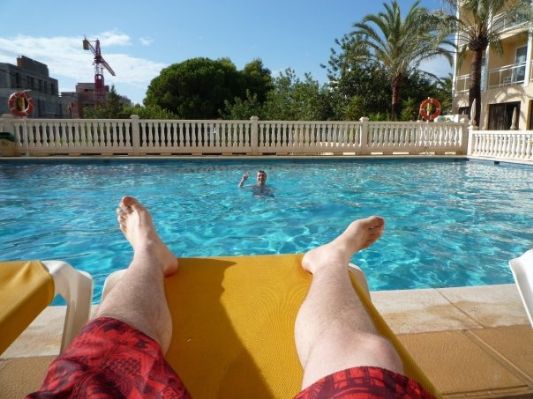
So it was with a degree of trepidation that I set out to meet two different sets of Brits in the Colmenar area.
Firstly, the English-run bar in town – Bar CO2 run by John & Karen, on the square outside the Ayuntamiento, the town hall. Now for all I know they are typical of the Brits around Colmenar. I can’t say yet. But I do know that they are not typical of the image I had unfairly brought with me. My image was of the “We don’t need to learn Spanish – everyone here speaks English” type, who shop only in English shops, drink only in English bars, and eat only at establishments such as “Fryer Tuck’s Fish’n’Chips” (and yes, I’m afraid it does exist). No, John & Karen have bucked that image completely. I was careful not to describe Bar CO2 as an English bar. It is English-run, but serves as many Spanish as English clients, along with a good smattering of Dutch, German, Canadian and several other nationalities. They speak Spanish to Spanish customers, and English to all the rest. And when I have gone there asking for advice, they know and recommend local Spanish tradespeople.
Secondly, with even greater trepidation, I set off to the Wednesday gathering of the Colmenar Social Club, To be honest, I was more tempted by the venue than the people, that first time. They meet at the Hotel Restaurant Arco del Sol, and many people had recommended the ceramics and furniture in the large showroom downstairs from the bar. So I had a good chat with Antonio, the owner, bought a rocking chair and a couple of small pots, and then nervously approached the English-speaking group out on the patio. Again, my assumptions were unfounded. I had expected an inward-looking group, sharing tips on English plumbers and pool-cleaners, complaining about Spanish bureaucracy, healthcare, and – well – everything really. Instead I found a lively, intelligent and friendly bunch, a mixture of pensioners, early retired, some working in Spain and others travelling regularly between Spain and the UK. They were open and welcoming, and generous with advice about internet providers and the care of lemon trees.
In Colmenar there are very few English people living right in the town itself – less than ten, probably, plus a few Dutch and Canadian. Most prefer to live outside in the campo in order to have a bit of land and a pool. These are not people living on English-speaking urbanisations with their own supermarkets and bars. Quite a few had spent much of their adult life living and working in a variety of other countries, so were British by birth and nationality but not so much by residence. Most of the Colmenar Social Club members live scattered across the campo, as many around Riogordo and Comares as in the immediate surroundings of Colmenar. Perhaps that very scatteredness is what makes this loose but supportive group so important to each other once a week. Someone to talk to who has a similar problem with the town hall or the electric company. Someone to lend a bit of scaffolding or a pressure washer when you need it. Someone to put the word out if you need a second-hand fridge, camera or bicycle.
So, time for me to rethink my stereotypes. I know the Brits of my assumptions are out there, because I’ve seen them on the coast outside Fryer Tuck’s Fish’n’Chips and waiting for the Allday Big Breakfast to eat during the Man United football match on the Sky big screen. But there are other types of ex-pats too. And they’re not all reinforcing the unfortunate common image of “Brits Abroad”.

© Tamara Essex 2012
 0
Like
Published at 1:26 PM Comments (4)
0
Like
Published at 1:26 PM Comments (4)
10 - Returning to Spain
Sunday, August 19, 2012
Perfect timing. More by luck than any planning, I’d been in England for the whole of the Olympics. And like many, I’d gone from a level of almost total disinterest (and a large degree of cynicism) to becoming totally hooked on sports I would never normally watch. So I’m glad I was there, particularly as it gave me the opportunity to test out the feelings of national loyalty that I’d written about in Blog 7 “Going Home”. I have no idea where it comes from, and I am nervous of excessive and misplaced nationalism, but something happens when that great Briton Mo Farah is 300 metres from home and the Kenyan guy is closing in on him. Something instinctive, tribal, guttural, wells up and you find yourself willing him on, screaming support at the screen, knowing that in every house in the land the words “Go Mo!” were ringing out in unison And the delight at his second gold medal, and the medals of the rowers, riders, swimmers, shooters, cyclists, sailors and other athletes, was something extraordinary to experience, this identification with all others who happen to have been born on these same islands, just for the short duration of a sporting event.
 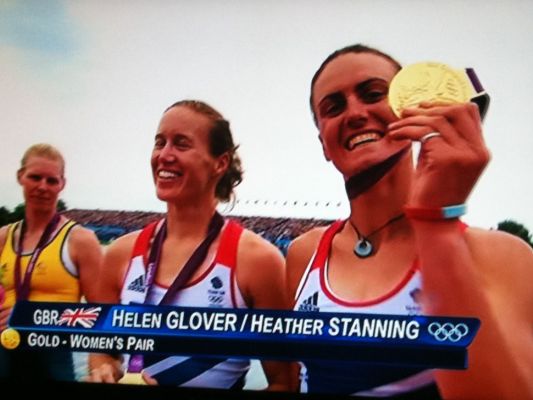
So pride welled up from the start of the Opening Ceremony, and lasted beyond the Closing Ceremony. I was pleased to be in the UK to share that pride with my British friends.
Then, as soon as it was all over, my attention turned back to Colmenar. Had Rafael been able to make the half-installed air-conditioning in the bedroom work? Had Antonio found me the perfect cheap and ancient little car to run about in? Had the carpenter started building my dark wooden cube shelf unit for the lounge? Would Jose turn up to connect the television aerial so I can watch Spanish television? Would the phone line / internet package be sorted so I can watch English television? Hugely excited to be returning to Colmenar, I packed an enormous suitcase of clothes, books, DVDs and a few home comforts, and headed ……. home?
© Tamara Essex 2012
 0
Like
Published at 10:03 PM Comments (3)
0
Like
Published at 10:03 PM Comments (3)
9 - Packing Up
Friday, August 17, 2012
One suitcase. One chance to take the books, DVDs, music, memorabilia, and a few of the special things that make a house a home. What to choose? Twenty kilograms of memories to put onto new shelves in a new home. There may be other opportunities, odd bits squeezed into hand luggage, maybe another suitcase another day. Possibly a car trip in the winter. But for the time being, one suitcase. One baggage fee paid to Ryanair. One bag booked into the hold to fly to Málaga tomorrow.
I need some books, but which few can be taken? I have my Kindle, of course, but no house can be a home without books on the shelf. A few books about Spain, a copy of “The Shadow of the Wind” by Carlos Ruiz Zafón (just the English language version – though I have the Spanish version too), and a couple of lighter novels for winter evenings. I need to re-read John Hooper’s “The New Spaniards” to understand more about modern Spanish culture, so that must go in.
A whole stack of DVDs and a handful of CDs, though I have neither a DVD player nor a CD player yet. Those need to be urgent purchases next week. Cables and chargers for laptop and mobile phone, It feels as though this suitcase should be full of the special things. It feels like the last opportunity, even though it isn’t. But there’s something highly symbolic about pacing through the rooms of the cottage, choosing these limited few things, the most important, to take their place in the Spanish house. Yet the case bulges with little of any significance. It’s more about practicalities and comfort than symbolism.
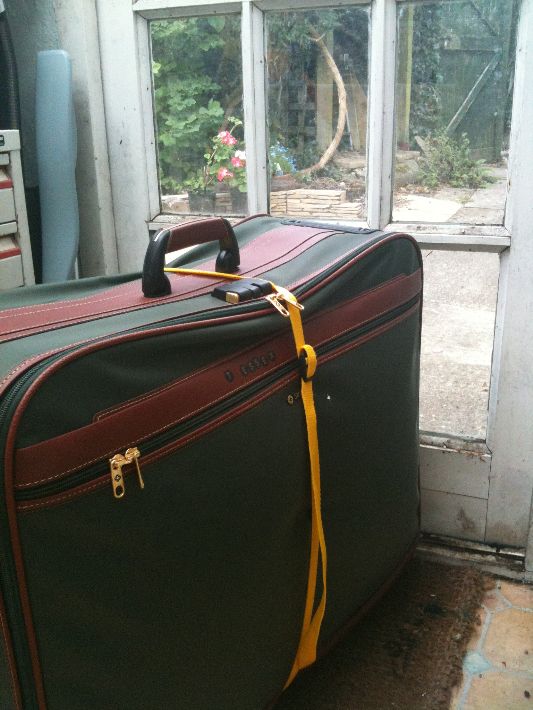 I add a pottery dove made by my friend Ann Wilson, perfect for the breakfast patio. A couple of painted ceramic coasters which I’d given my mum – it’s the little things like that which will remind me of her every day. I add a pottery dove made by my friend Ann Wilson, perfect for the breakfast patio. A couple of painted ceramic coasters which I’d given my mum – it’s the little things like that which will remind me of her every day.
Weigh-in time. 20.3 kg. Just 300 grams over. I’ll risk it. The case is ready.
I think I’m ready now as well.
© Tamara Essex 2012
 0
Like
Published at 6:39 PM Comments (5)
0
Like
Published at 6:39 PM Comments (5)
8 - The OTHER Campo
Monday, August 13, 2012
You know when you buy some new clothes, or some new cups or plates, or even a new beachtowel, you really love the new one and get rather obsessed with it? But then over time you start using the old ones again and allow them a new lease of life, rescuing them from the dark corner to which they had been banished?
Well I have clearly been guilty of this. Despite deliberately entitling this blog “A Foot in Two Campos”, I have so far focused entirely on my exciting new venture, the charming little casita in Colmenar. But in between my ever-lengthening trips to Spain, I am fortunate to live in the beautiful North Dorset countryside – a charming campo in its own right. At the moment Shaftesbury town (famous for Gold Hill which appeared in the iconic Ridley Scott advert for Hovis), is bedecked with bunting, the shops are decorated with Union flags, and the town – like most of the country – has been revelling in Olympic spirit.
Last month the Olympic Flame came past my cottage -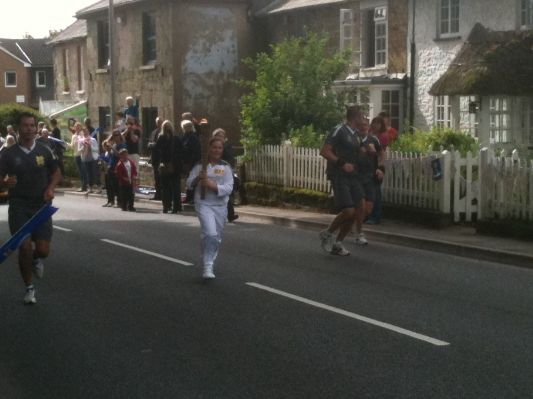
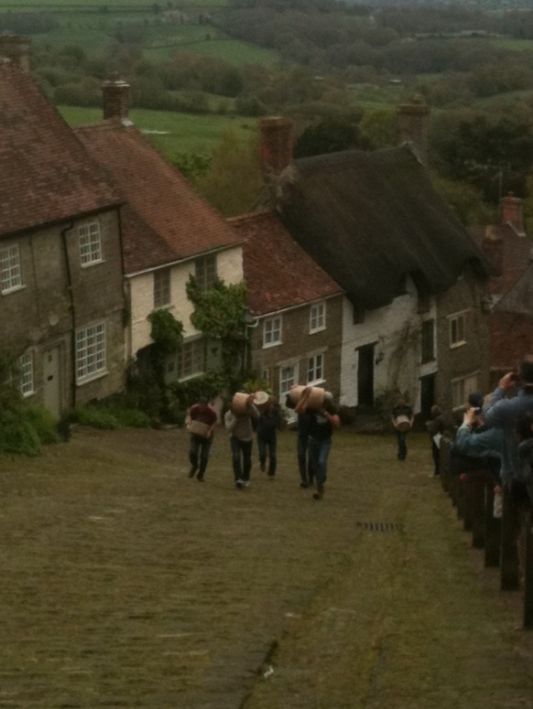 And earlier in the spring we celebrated the 8th Shaftesbury Feastival of Local Food. A new event this year was the Gold Hill Cheese Race, where competitors had to run UP the hill carrying 22kg rounds of cheese! And earlier in the spring we celebrated the 8th Shaftesbury Feastival of Local Food. A new event this year was the Gold Hill Cheese Race, where competitors had to run UP the hill carrying 22kg rounds of cheese!
It’s a small, mostly friendly town. Just like Colmenar, Shaftesbury is surrounded by villages, hamlets, and isolated farmhouses which use the town as their centre for banking, shopping, and often selling. I’m not a Shaftesbury native, I’m guilty of being an “incomer” of a mere eleven years. But my professional work supporting charities was a useful way in, and I became a Trustee of a couple of small local charities which was a good way of meeting people and feeling useful. Starting the Shaftesbury Feastival of Local Food 8 years ago was a great way of getting to know a lot of farmers, food producers, and delicatessens!
There are many parallels between Shaftesbury and Colmenar. Similar size, similar rurality. Of particular interest is the fact that many people choose to retire to Shaftesbury, which now has a higher-than average age profile. The town has therefore developed an elasticity, expanding to include incomers. Similarly, the campo around Colmenar has a good sprinkling of ex-pats (though less than half are British). In the town centre there are only a few non-Spanish, and the Spanish neighbours say they have no concerns about foreigners moving in. Indeed they say it helps the local economy and helps to ensure that independent shops, the post office, and the two banks, remain open. Surprisingly, I’ve heard more of the “pull up the drawbridge” mentality in Shaftesbury, where frankly the incomers are unlikely to do much damage, than I have in Colmenar, where surely the locals must be acutely aware of the carnage on parts of the Costas, wrought largely by the British elements of the ex-pat community.
Inevitably this blog will continue to look at similarities and differences between my two home towns.
© Tamara Essex 2012
 0
Like
Published at 1:41 PM Comments (4)
0
Like
Published at 1:41 PM Comments (4)
7 - Going Home?
Sunday, August 12, 2012
Going home. Where is that? What does it mean? Is it where your bricks and mortar are? Where your parents are? Where your children are? Or, over the next few weeks, is it the place that makes your heart swell when an Olympic gold is won?
I met an Englishman at the Colmenar Social Club. “I haven’t been home for over 20 years” he announced. Struck by the obvious anomaly in that statement, I glanced around to see if anyone else had picked it up. But there were nods of agreement. “I went home about three years ago for a wedding, but that was the first time for about ten years” said a woman. Both had lived in Spain for well over 20 years and have no intention of ever living anywhere else.
So where is their home? Surely the only answer to that, is Spain! Neither has property in England, and one has children living abroad as well, one in the US and one in Saudi Arabia. And yet both instinctively call the UK “home”. Others at the social club did the same. “Why would we want to go home?” one asked, “the weather’s terrible at home!” “I visited my grandchildren at home once” said another, “but mostly they come out to see us here.” Always differentiating between “home” (the UK), and “here” (Spain). “Here” is where they have laid their hat, but does that make it home? Something in them stops them calling Spain “home”, even after so long.
Taking the opposite position is John, who runs the Bar CO2 on the square in Colmenar. He last visited the UK three years ago, and all the time he was there he was looking forward to getting back home as soon as possible. He talks about going “to the UK”, and then coming “home” to Spain. The choice of language defines the perception.
A couple of my new friends here seem so “at home” in Colmenar, so in tune and comfortable with the Spanish culture and way of life, that I was surprised to discover that they DON’T live here but are just visiting their daughter. It feels wrong to think they will soon fly half way across the world back to their home in Canada, when they seem imbued with the essence of the Axarquía, more than almost any other non-Spaniard I have met.
So today I fly home to Dorset. To the little thatched cottage I originally bought eleven years ago as a “second” home, but which within three months became the place I wanted to be, so I escaped from London permanently and moved fulltime to Shaftesbury.
Home. Yes, I’m going home to the UK where my home, my work and most of my friends are. Where my books and music are. Where the computer holds all my files (until one day everything is transferred to “The Cloud” so that it’s all stored up in cyber-space, as it will be in the near future, I’m told).
 And then shortly I shall return here to Colmenar. Backwards and forwards for the next few months while my brain learns to cope with new opportunities, a new place to be, new ways of life. The end of the responsibilities of caring for my mother – inconsolable sadness at her death, in parallel with the slow realisation that out of grief and loss can come change and opportunity. And then shortly I shall return here to Colmenar. Backwards and forwards for the next few months while my brain learns to cope with new opportunities, a new place to be, new ways of life. The end of the responsibilities of caring for my mother – inconsolable sadness at her death, in parallel with the slow realisation that out of grief and loss can come change and opportunity.
I’m going home to the UK today. I’ll watch the Olympics Closing Ceremony at home in the UK. I’ve cheered on Team GB and share the national rejoicing when “we” win a medal. I’ve taken pride in Spain’s successes too, as I did in their recent football triumphs. “Their” triumphs, “our” medals. I’m British, returning home to England. ShortlyI wil l visit Spain again. I will watch myself over the coming months and years to see if – or when – the language I use changes to reflect a different perception of “home”, where it is, and what defines it.
© Tamara Essex 2012
 0
Like
Published at 10:13 PM Comments (24)
0
Like
Published at 10:13 PM Comments (24)
6 - My Bank Collapsed on Friday
Sunday, August 12, 2012
My bank, Cajamar, collapsed on Friday.
Fortunately, its collapse was physical rather than fiscal, as the extensive building work above the Colmenar branch suddenly broke through, leaving customers to dive for waste-paper bins to put on desks to catch the dribbles of water from above.
I remember years ago reading a piece of research that found that when we enter a setting full of strangers, such as getting on a bus or sitting in a hospital waiting area, we gravitate towards the person most like us, and sit near them. Some ancient, long-submerged tribal instinct, probably. Anyway, the queue (if you can call it that) in the bank was enormous. People were milling about everywhere, and only one caja was open. “¿Ultimo?” I asked, looking around to see who believed they were the last to have joined the throng. “Ultimo” replied an old man in a straw hat leaning against the window. The wait seemed endless. At last a young woman took her turn, vacating her chair and those of her two children. Two other women dived for a seat, and I nipped round the pillar to grab the third. We shared a conspiratorial (and tribal) grin, pleased with our little achievement. The door opened. “¿Ultimo?” asked the new arrival. “Ultima” I replied.
The wait continued. Both women left their chairs to get served. Both vacancies were filled by elderly men in working trousers, braces, and straw hats. My tribal comfort zone diminished. One of the men looked at his watch and muttered how ridiculous it was that there was only one caja open. I agreed and we shared a shrug. The endless banging and sawing from the building works above became louder. We shared another shrug, eyes rolling upwards towards the noise. Then Ellie came in – a ripple of anticipation ran through the waiting crowd, hoping she would open a second desk. But no. She took over from Jose who departed rather rapidly and with a distinct air of relief. One by one people slowly got served, while even more came in behind.
Then it happened. A small ceiling tile cracked and a sudden cloud of white dust was followed by a spurt of water, which quickly slowed to a drip. 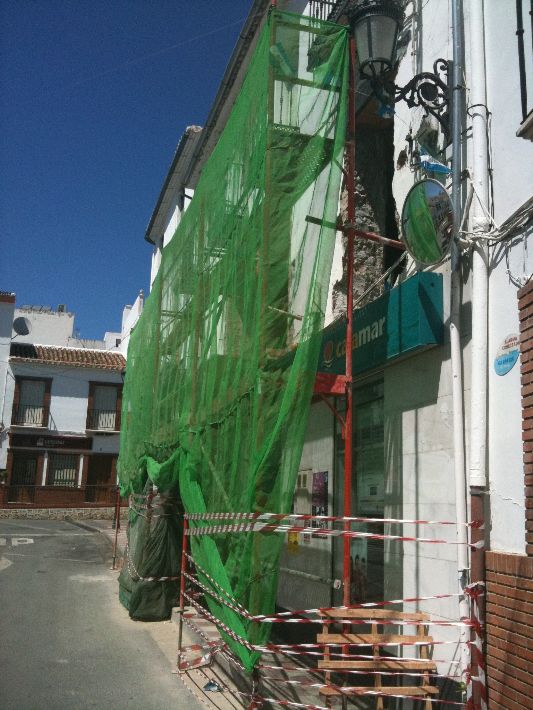 A young man in overalls bearing the Mecol logo, the local electrical company, leapt for a waste-paper bin, moved the computer keyboard out of the way, rescued a pile of customer files and put the bin on the desk to catch the drips. After the flurry of excitement, we settled back to our random queuing. Then at the other side of the office, a whole polystyrene tile fell, again followed by a spurt of water. Three customers busied themselves moving papers, telephones and computers, placing another waste bin on this desk. The old man on my left caught my eye – another shrug, another roll of the eyes. A sudden unbidden thought made me laugh out loud. He looked at me questioningly. “Está simbólico del crisis” I said. “El banco se cae alrededor de nosotros”. “It’s symbolic of the crisis – the bank is collapsing around us.” His face cracked and he bent right over in laughter. The man on the other side joined in. Another asked what the joke was and he repeated it. It got passed around the crowd until everyone was chuckling. Two men clapped me on the back as I finally got up to take my turn at the caja. The tribal boundary seemed a little more elastic. Ellie gave me her enormous red-lipped smile. “There’s only one person here who didn’t like your joke” she told me in Spanish. “The boss?” I asked, fearfully. “No – the Englishman over there – he didn’t understand it.” A young man in overalls bearing the Mecol logo, the local electrical company, leapt for a waste-paper bin, moved the computer keyboard out of the way, rescued a pile of customer files and put the bin on the desk to catch the drips. After the flurry of excitement, we settled back to our random queuing. Then at the other side of the office, a whole polystyrene tile fell, again followed by a spurt of water. Three customers busied themselves moving papers, telephones and computers, placing another waste bin on this desk. The old man on my left caught my eye – another shrug, another roll of the eyes. A sudden unbidden thought made me laugh out loud. He looked at me questioningly. “Está simbólico del crisis” I said. “El banco se cae alrededor de nosotros”. “It’s symbolic of the crisis – the bank is collapsing around us.” His face cracked and he bent right over in laughter. The man on the other side joined in. Another asked what the joke was and he repeated it. It got passed around the crowd until everyone was chuckling. Two men clapped me on the back as I finally got up to take my turn at the caja. The tribal boundary seemed a little more elastic. Ellie gave me her enormous red-lipped smile. “There’s only one person here who didn’t like your joke” she told me in Spanish. “The boss?” I asked, fearfully. “No – the Englishman over there – he didn’t understand it.”
© Tamara Essex 2012
 0
Like
Published at 1:23 PM Comments (7)
0
Like
Published at 1:23 PM Comments (7)
5 - Travelling with Selina
Saturday, August 11, 2012
I’ve been travelling with a new friend, Selina, this last week. Actually I think she’s lots of people’s friend, because Selina is the default voice on my TomTom satnav.
I didn’t think I’d like her but in fact we’re getting on fine. I had practiced with her in the UK a bit, just to make sure she knew what she was doing, and slowly my trust in her has grown. She tells me what lane to be in to make sure I get the junctions right, and she gives advance warnings at exactly the right time.
Trouble is she’s awfully British. Terribly BBC, don’t you know. Which is fine, until she starts trying to pronounce Spanish place-names. Nobody has ever told her that usually in Spanish you put the emphasis on the penultimate syllable. We went for a drive the other day, heading down to the coast at Velez-Málaga. Málaga is an exception to the rule about the penultimate syllable, so it has an accent on the first á to show you where to hit the stress. Well any British hen party flying out from Stansted or Bournemouth can pronounce Málaga alright, but not our Selina with her Queen’s English. “Turn right to ….. Vell … Ezz …. Mar ….. Lar ….. Gar …..” she intones, with equal emphasis on every syllable, and an annoying downward cadence on each one too.
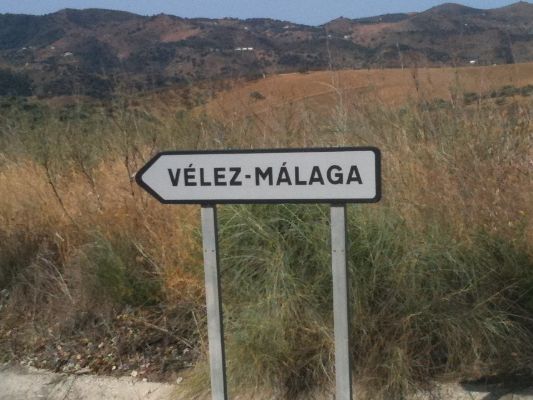 But I can forgive her this. In fact on my second trip down to Vel. Ez. Mar. Lar. Gar. I quite looked forward to the turning and to hearing her say it. I forgive her because the way she directs me is such a perfect metaphor for life. The wonderful Margaret MacKenzie of the Ministry of Sales was the first to point this out in a business network presentation, noting that the nice thing about a sat-nav is that it doesn’t get cross or raise its voice if you take a wrong turning. It calmly and quietly suggests “At the first opportunity, turn around.” But I can forgive her this. In fact on my second trip down to Vel. Ez. Mar. Lar. Gar. I quite looked forward to the turning and to hearing her say it. I forgive her because the way she directs me is such a perfect metaphor for life. The wonderful Margaret MacKenzie of the Ministry of Sales was the first to point this out in a business network presentation, noting that the nice thing about a sat-nav is that it doesn’t get cross or raise its voice if you take a wrong turning. It calmly and quietly suggests “At the first opportunity, turn around.”
Well Selina, being a shiny new 2012 model, is even more advanced than that. Yes, when I deliberately ignored her and took a different turning to go into the Viveros, the garden centre, she did indeed utter those immortal words. Because she knew I was in a dead end – clever Selina! But usually she doesn’t even suggest turning round or back-tracking, she simply re-calibrates, recognises that we are now where we are, and instead of shrieking the famous comedy line “Oooh you don’t want to start from here!”, she finds a new and convenient way of enabling you to continue forward so that you rejoin your original route further along. Plus of course, you are perfectly entitled to decide that you like your new direction, and you can change your destination at any time.
We all need a Selina in our lives. Fortunately most of us have the equivalent in our friends. Helping us take tentative steps along our chosen direction. Gently supporting us if we falter. Helping us clarify our options – continue, turn back, or change to a new direction. Never critical, never cross, never stubborn, never rigid. Travelling alongside, but always allowing us our freedom. Always willing and able to re-calibrate at a moment’s notice. Without even stopping to think about it I can easily come up with a dozen real-life Selinas that I regularly or occasionally rely on. Funny how so many of them are women! Not all, but most. Fellow-travellers, one and all. Glad to have my GPF alongside me – Global Positioning by Friendship.
© Tamara Essex 2012
 0
Like
Published at 11:25 AM Comments (1)
0
Like
Published at 11:25 AM Comments (1)
4 - Small Change
Friday, August 10, 2012
I lengthened my morning walk today. Slightly further round the outskirts of the hill. More views. Came across an enormous, gentle tethered horse calmly ignoring the yappy little dog jumping around its legs. Just below the escarpment were various signs of work-in-progress – a new corrugated iron roof on a shed, a new fence around a chicken coop, half a pallet of bricks for something, general improvements going on. Some chickens were scrabbling around for food – not scrawny things but huge plump ones, mostly shiny black, a few white, one golden. Behind them, emerging blinking into the early sun from its whitewashed stone hut, was what appeared to be a llama. With silly jokes running round my head (“¿Como se llama, llama?”) I looked for a way to get closer. From the track on the other side, its body looked more like a sheep but with a ludicrously long neck.
With the creature still unidentified, I continued exploring, unsure quite where the path would end up. With the sun getting warmer and a sudden steep rise ahead, I turned in from the perimeter and cut through an alley to find myself on Calle Laurel. Ah good, just a little bit higher up from my second-favourite panadería. Avoiding the spray as an old man washed his truck, I decided to treat myself, so walked round to 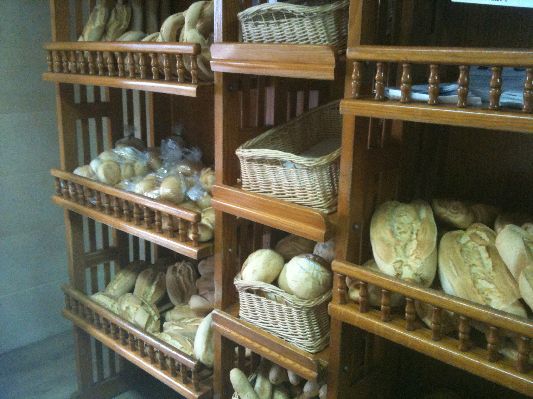 my most favourite panadería. I chose something equally as unidentifiable as the llama/sheep, but looking like flaky pastry decorated with a cross of custard, topped with a slice of orange. “One of those please,” I indicated. “Only one?” she replied, placing it on the scales to weigh it before wrapping it beautifully for me. “Sesenta y uno” she said - 61 centimos. I’d come prepared with a few coppers as well as the bigger coins, so handed over a 50c, a 10c and a 1c. “No” she said. I took another look – had I got the coins wrong? Or misheard the figure? She handed back the single centimo. “No es necesario” she smiled – it’s not necessary. my most favourite panadería. I chose something equally as unidentifiable as the llama/sheep, but looking like flaky pastry decorated with a cross of custard, topped with a slice of orange. “One of those please,” I indicated. “Only one?” she replied, placing it on the scales to weigh it before wrapping it beautifully for me. “Sesenta y uno” she said - 61 centimos. I’d come prepared with a few coppers as well as the bigger coins, so handed over a 50c, a 10c and a 1c. “No” she said. I took another look – had I got the coins wrong? Or misheard the figure? She handed back the single centimo. “No es necesario” she smiled – it’s not necessary.
It’s true that many shops can’t be bothered to either accept or return the tiniest coins, simply rounding everything up or down. But then why did she ask me for 61c? I wondered fleetingly if their tills ever balance at the end of the day.
© Tamara Essex 2012
 0
Like
Published at 1:08 PM Comments (6)
0
Like
Published at 1:08 PM Comments (6)
3 - The Miracle of Nature
Thursday, August 9, 2012
Waking up. Sitting in bed watching the sunrise roll across the hills, lighting each field and fold in turn. A million-dollar view ….. no, beyond price. Coffee on the patio, out of the sun but warm and bright. The morning walk around the edge of the village. Stunning views across the miles of trees that provide food for the bees to flavour the extraordinary range of honeys produced locally. Colmena – beehive – how the town was named. Colmenar – the beehive of the Axarquía region, benefitting from the miracle of worker bees.
Back through a little alley to my second-favourite panadería for freshly-baked bread. Today’s breakfast is the new loaf topped with Miel de Milflores – thousand-flower honey. A smooth, light flavour, not as strong as my last jar of Miel de Aguacate (from the blossom of the avocado tree) which boasted extensive health-giving properties (something to do with my boosting my iron, I vaguely recall) but was overly-strong for my taste. Plenty to choose from though, as between the bakery and my house is El Museo de la Miel, the Museum of Honey. Not a museum in the usual sense, but a fascinating centre dedicated to demonstrating all aspects of honey production, with a shop offering try-before-you-buy of the eight or more flavours produced. I must pick up the leaflet which explains which honey should be used for which ailment.
Eating thousand-flower honey in my little dead-end cobbled street, named Rincón de las Flores – the flower corner, or flowery nook. There’s a theme emerging, but it can’t be taken much further as I’m not good with gardens and would not be assiduous enough at watering for needy flowers to survive the Andalucian sun.
But today I bought a lemon tree, and have drenched it in water. I chose one with lots of new growth, hoping the young pale leaves indicate that it is happy and healthy. 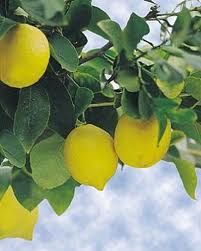 Tomorrow I will buy una maceta, a big ceramic pot, from Antonio’s amazing selection underneath the Hotel Arco Del Sol, and I will plant it in my mother’s memory. She gave me the push I needed to come here and buy this house, and she will always be here with me as I do my best to nurture her lemon tree. We had five or six fantastic holidays in Italy in the 1980s and 90s, and on one we travelled right down to the southern “toe” end of the country to stay on a Calabrian farm in rural countryside not dissimilar to the Axarquía. I will always remember mum’s childlike delight on discovering she could reach through our bedroom window and pluck a sweet-smelling lemon straight from the tree, hot to the touch from the strength of the sun. If my tree – her tree – grows big enough to bear fruit, I shall try to capture and never to lose that same delight in the miracle that is a freshly-picked, sun-kissed lemon. Tomorrow I will buy una maceta, a big ceramic pot, from Antonio’s amazing selection underneath the Hotel Arco Del Sol, and I will plant it in my mother’s memory. She gave me the push I needed to come here and buy this house, and she will always be here with me as I do my best to nurture her lemon tree. We had five or six fantastic holidays in Italy in the 1980s and 90s, and on one we travelled right down to the southern “toe” end of the country to stay on a Calabrian farm in rural countryside not dissimilar to the Axarquía. I will always remember mum’s childlike delight on discovering she could reach through our bedroom window and pluck a sweet-smelling lemon straight from the tree, hot to the touch from the strength of the sun. If my tree – her tree – grows big enough to bear fruit, I shall try to capture and never to lose that same delight in the miracle that is a freshly-picked, sun-kissed lemon.
© Tamara Essex 2012
 0
Like
Published at 7:16 PM Comments (2)
0
Like
Published at 7:16 PM Comments (2)
2 - Waiting
Wednesday, August 8, 2012
Waiting. The man from the gas company is due any time from 10am. He has to check my gas fittings, fit new tubes (they must be replaced every five years, and are stamped with their expiry date – the ones in my house have expired without ever being used, while the house stood empty), give me a contract, and supply me with two bombonas, big gas bottles, one for the cooker and one for the water heater.
Waiting. Things to do. Lorenzo, who is building a new house next door for his son, sends a painter in to whitewash my patio wall and repaint where he had retiled his son’s roof and had replastered the top of my wall. The painter does a good job, paints more of my wall than he has to, and leaves the patio clean and now even brighter. I beg a favour from Lorenzo, who kindly tweaks my cistern to stop the constant dribble of water into the toilet. Rocío, my lawyer, sends her husband in to change the locks. Poco a poco, little by little. The jobs get ticked off the list.
Waiting. Candelária pops in from the house opposite. She is pleased I have moved in but is worried I may not have water to drink or bread. I assure her that I do. She says that if I need anything from the shop I must ask her to get it for me. She is approximately 112 – shouldn’t I be doing her shopping?  She is about to leave when suddenly she sees a religious icon on the wall. Despite my atheism I had asked the previous owner to leave me a carved stand with terracotta oil pots, and the painting on the wall above it – both looked so right in their positions I felt they should stay. Candelária bends her knee and crosses herself in front of it, thenpresses a kiss to the glass. Fittingly, the painting is of the village saint Candelária, for whom my neighbour was named. She pulls from her neckline a miniature portrait on a silver chain, the same picture as mine. Her thick Andaluz accent becomes faster and harder to follow as she extols the painting’s virtues and her excitement at seeing it. My attachment to it increases as my understanding grows of its story and its place. She is about to leave when suddenly she sees a religious icon on the wall. Despite my atheism I had asked the previous owner to leave me a carved stand with terracotta oil pots, and the painting on the wall above it – both looked so right in their positions I felt they should stay. Candelária bends her knee and crosses herself in front of it, thenpresses a kiss to the glass. Fittingly, the painting is of the village saint Candelária, for whom my neighbour was named. She pulls from her neckline a miniature portrait on a silver chain, the same picture as mine. Her thick Andaluz accent becomes faster and harder to follow as she extols the painting’s virtues and her excitement at seeing it. My attachment to it increases as my understanding grows of its story and its place.
Waiting. Until the gas man comes I cannot go out, cannot even waste an hour sunbathing as I may not hear the door from the roof terrace. There is no doorbell – do I need one? Or does everyone just shout and bang the door? Another question, another task. . Poco a poco, little by little, jobs get added to the list.
Waiting.. More coffee. It occurs to me that there is something very Spanish about waiting. No rush, it’ll happen when it happens. In the meantime – relax, have another drink. No pasa nada – there is nothing amiss.
Waiting? No. Not any more. Just relaxing ……. thinking ……. being.
© Tamara Essex 2012
 0
Like
Published at 12:14 PM Comments (0)
0
Like
Published at 12:14 PM Comments (0)
1 - First Night in my Casita
Tuesday, August 7, 2012
Context is everything. To be irriated, by something, or to not be irritated by it, comes down to the context. A driver cuts you up and jumps an orange light – irritating. A driver cuts you up, jumps an orange light, turns quickly into the hospital car park and dashes into A&E with her sick baby – not so irritating.
Kids shouting in the street after bedtime – irritating. Church bells at night – irritating. Dogs barking outside – irritating. As I lay in bed in my first night in my own little corner of Andalucían paradise, I listened to the children (and adults) shouting, the bells pealing and the dogs barking.
Despite the steepness of my little dead-end road, the family just above me were sitting precariously outside their house, eight of them on wobbly plastic patio chairs, laughing and chatting sociably at 10.45pm, the children racing up and down the cobbled hill still joining in the conversations – calling back up to their grandparents from the bottom of the slope. I’d introduced myself on my return half an hour before, and the smallest child, maybe about six years old, had given me a beautiful smile. My evening was ending early for Spain, tired from the excitement of signing contracts at the Notaría and moving in, all I wanted was a cup of tea and to try out my bed. Theirs was just beginning – a long sociable chat in the cool of the evening air.
11pm and the church bells chimed – that lovely clanking sound of ancient iron bells from a whitewashed tower. 11.03pm and the bells from the town hall followed – a higher note and a different rhythm. 11.07pm and the Ermita brought up the rear, the sound of their bells travelling clearly through the night air from their viewpoint high at the top of the hill-town. No coming together of church and state here, at least as far as the bells are concerned.
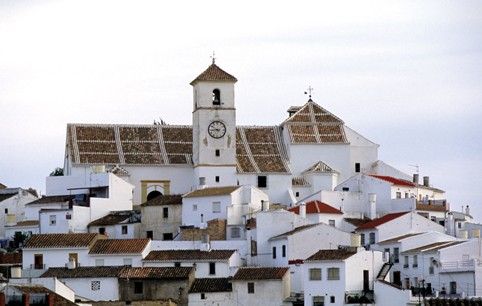 As the dog barked and the bells pealed and the children shouted and the adults laughed, I tried to remember what I’d read in John Hooper’s excellent book “The New Spaniards” - an insightful analysis of Spanish culture, the country’s rapid (and comparatively recent) transition to a modern democracy, and the people’s complex use of private space and public space. As the dog barked and the bells pealed and the children shouted and the adults laughed, I tried to remember what I’d read in John Hooper’s excellent book “The New Spaniards” - an insightful analysis of Spanish culture, the country’s rapid (and comparatively recent) transition to a modern democracy, and the people’s complex use of private space and public space.
Did I remember it all? No. Was I irritated by the sounds of Colmenar surrounding my new home? No. Did I find out whether the church bells pealed again at 11.30? No. As I struggled to recall the detail of how history and climate have shaped culture and behaviour, the sounds and the context of Spain, Andalucía, and Colmenar circled my house, drifted in through the open windows, curled around my pillows and into my sleepy brain, and I slept.
© Tamara Essex 2012
 1
Like
Published at 9:16 PM Comments (4)
1
Like
Published at 9:16 PM Comments (4)
Spam post or Abuse? Please let us know
|
|